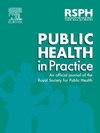The impact of workplace violence on healthcare workers during and after the COVID-19 outbreak
IF 1.9
Q2 PUBLIC, ENVIRONMENTAL & OCCUPATIONAL HEALTH
引用次数: 0
Abstract
The COVID-19 pandemic has intensified workplace violence (WPV) against healthcare workers, exposing them to unprecedented levels of aggression. Incidents of verbal abuse, threats, and physical assaults have increased, especially in high-stress environments such as emergency departments and intensive care units, exacerbating psychological challenges for healthcare staff. This commentary explores the profound impact of WPV on healthcare workers' mental health and job satisfaction. Dehumanization - treating healthcare workers as resources rather than individuals - is a key factor that fuels aggression and undermines empathy within healthcare settings. WPV not only affects the personal well-being of healthcare professionals but also compromises patient care quality and the efficiency of healthcare systems. Effective strategies are urgently needed to address WPV, such as comprehensive training in de-escalation techniques, organizational policies, and enhanced safety protocols. An integrated approach that combines psychological support, policy reform, and preventive measures is essential to ensure a safer and more resilient healthcare environment for the future.
2019冠状病毒病疫情期间和之后,工作场所暴力对医护人员的影响。
COVID-19大流行加剧了针对医护人员的工作场所暴力(WPV),使他们面临前所未有的侵略。言语虐待、威胁和人身攻击事件有所增加,特别是在急诊科和重症监护病房等压力很大的环境中,加剧了医护人员面临的心理挑战。这篇评论探讨了WPV对医护人员心理健康和工作满意度的深远影响。非人化——将医护人员视为资源而非个体——是在医疗环境中助长侵略和破坏同理心的关键因素。WPV不仅影响医疗保健专业人员的个人福祉,而且还损害患者护理质量和医疗保健系统的效率。目前迫切需要有效的战略来应对野生脊灰病毒,例如在降低升级技术、组织政策和加强安全协议方面进行全面培训。结合心理支持、政策改革和预防措施的综合方法对于确保未来更安全、更有弹性的医疗保健环境至关重要。
本文章由计算机程序翻译,如有差异,请以英文原文为准。
求助全文
约1分钟内获得全文
求助全文

 求助内容:
求助内容: 应助结果提醒方式:
应助结果提醒方式:


